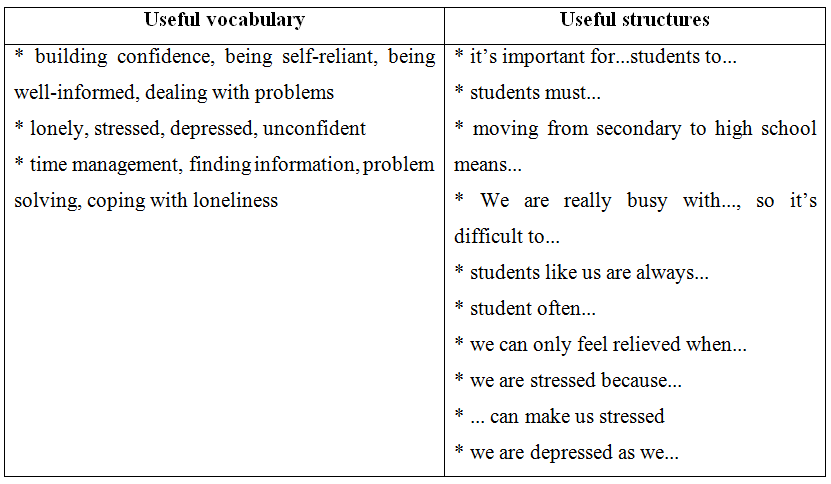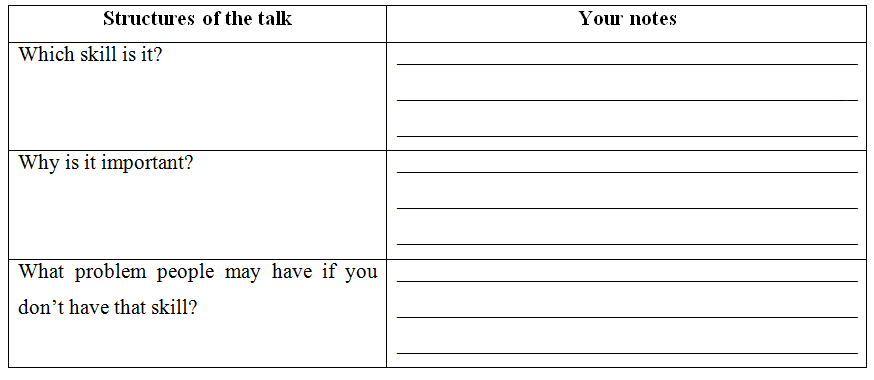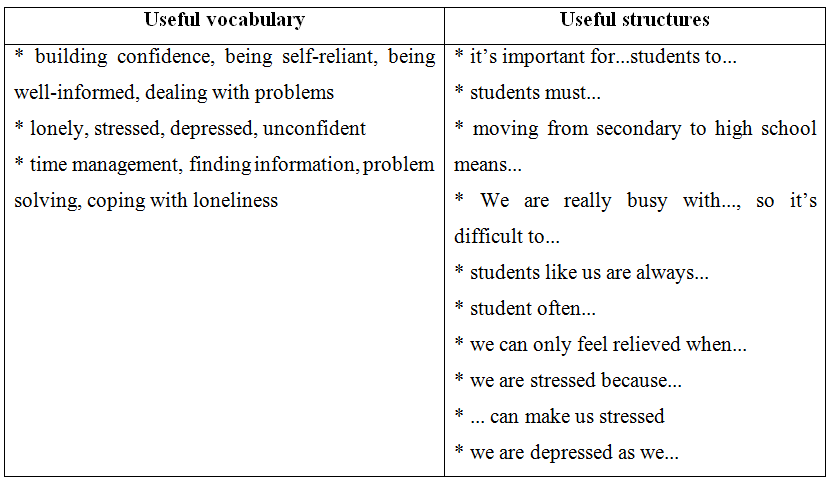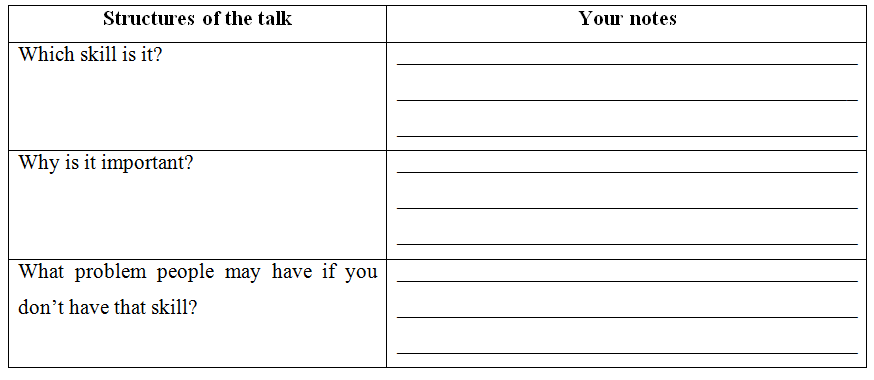HỌC VIỆN HOÀNG GIA
CÂU HỎI
Talk about what you think is the most important skill you need as a high school student.
You can use the following questions as cues:
* Which skill is it?
* Why is it important?
* What problem people may have if you don’t have that skill?
Useful languages:


Now you try!
Give your answer using the following cues. You should speak for 1-2 minutes.
1. it’s important for...students to...
2. Moving from secondary to high school means...
3. We are really busy with..., so it’s difficult to...
4. Students like us are always...
5. We can only feel relieved when...
6. We are stressed because...
7. We are depressed as we...
Now you tick!
Did you ...
- answer all the questions in the task?
- give some details to each main point?
- speak slowly and fluently with only some hesitation?
- use vocabulary wide enough to talk about the topic?
- use various sentence structures (simple, compound, complex) accurately?
- pronounce correctly (vowels, consonants, stress, intonation)?
Let’s compare!
Finally, compare with the sample answer on page 170.
ĐỀ THI
Câu hỏi thuộc đề thi: 110 câu Trắc nghiệm Chuyên đề 11 Unit 3. Becoming Independence
LỜI GIẢI
Talk about what you think is the most important skill you need as a high school student
Dịch nghĩa câu hỏi:
Hãy nói về điều mà bạn nghĩ là kỹ năng quan trọng nhất đối với một học sinh cấp 3.
Bạn có thể sử dụng các câu hỏi sau đây làm gợi ý:
* Kĩ năng đó là gì?
* Tại sao nó quan trọng?
* Bạn sẽ gặp vấn đề gì nếu không có kĩ năng đó?
Gợi ý trả lời:
MAIN IDEAS (Ý Chính)
Reasons (lí do)
* build confidence (v.phr.) (xây dựng sự tự tin)
* get well-informed (v. phr.) (hiểu biết)
* get self-reliant (v. phr.) (tự lập)
* deal with problems (v.phr.) (giải quyết vấn đề)
Troubles (rắc rối)
* lonely (adj.) (cô đơn)
* depressed (adj.) (chán nản)
* stressed (adj.) (càng thẳng)
* unconfident (adj.) (không tự tin)
Skills (Kĩ năng)
* time management (n.) (quản lí thời gian)
* finding information (n.) (tìm thông tin)
* problem solving (n.) (giải quyết vấn đề)
* coping with loneliness (n.) (đối phó với sự cô đơn)
Bài mẫu:
In my opinion, it’s important for high school students to have time-management skill, and it’s by far the most necessary one. Moving from secondary to high school means there are heavier loads of schoolwork to do. We are really busy with a lot of homework and many extracurricular activities, so it’s difficult for us to find any time for ourselves and family. Especially, when mid-term or final tests are approaching, students like us are always under pressure. We can only feel relieved when we know how to use time wisely.
If we don’t know how to manage our limited time, we may get stressed and depressed. We are stressed because we have to spend most of our time doing homework, and don’t know whether we can finish it or not. We are depressed as we have no free time to relax, and have fun with friends and family members. Therefore, time management skill is pivotal to me.Theo quan điểm của tôi, kĩ năng quản lý thời gian rất quan trọng đối với học sinh cấp 3, và nó là kĩ năng cần thiết nhất. Chuyển từ cấp hai lên cấp ba đồng nghĩa với việc khối lượng bài tập nhiều hơn. Chúng tôi thực sự bận rộn với rất nhiều bài tập về nhà và các hoạt động ngoại khóa, vì vậy chúng tôi rất khó tìm được thời gian cho bản thân và gia đình. Đặc biệt là khỉ kì kiểm tra giữa kì hay cuối kỳ tới, những học sinh như chúng tôi luôn bị áp lực. Chúng tôi chỉ có thể thấy an tâm khi nào mình biết cách sử dụng thời gian thông minh.
Nếu chúng tôi không biết cách điều chỉnh thời gian hạn hẹp mình có, thì chúng tôi có thể bị căng thẳng và chán nản. Chúng tôi bị căng thẳng vì phải dành phần lớn thời gian để làm bài tập về nhà, và không biết liệu chúng tôi có thể hoàn thành nó hay không. Chúng tôi chán nản vì không có thời gian rảnh để thư giãn, và vui vẻ với bạn bè và các thành viên trong gia đình. Do đó, kỹ năng quản lý thời gian là quan trọng nhất đối với tôi.CÂU HỎI CÙNG BÀI THI
Choose the best option to complete each of the following sentences.
If you have good__________skills, you will use your time wisely.
Complete sentences with the words given in the box. There is ONE extra word
confident
humanitarian
determined
decisive
self-reliant
well-informed
reliable
A__________friend is the person that you can rely on when you are in trouble.
Complete sentences with the words given in the box. There is ONE extra word
|
confident |
humanitarian |
determined |
decisive |
|
self-reliant |
well-informed |
reliable |
|
Choose the word or phrase that is CLOSEST in meaning to the underlined part in each of the following sentences.
Do you think that he can cope with problems himself?
Read the following sentences and link (∪) the consonant sounds and the vowel sounds.
Choose the best option to complete each of the following sentences.
1. My parents were reallv disappointed__________out the truth.
23. His advice__________this car early was totally right. The price has increased sharply since then
23. His advice__________this car early was totally right. The price has increased sharply since then
Choose the underlined part which needs correction
1. Your success at work doesn’t depend on your willing for working overtime.
1. Your success at work doesn’t depend on your willing for working overtime.
4. Many Vietnamese parents think that it’s their responsibility provide their children with all things in life.
4. Many Vietnamese parents think that it’s their responsibility provide their children with all things in life.
Rewrite the following sentences using to-infinitives so that it has the similar meaning to the first sentence.
1. My daughter watch this short video many times. It’s interesting.
→ _________________________________________________
1. My daughter watch this short video many times. It’s interesting.
→ _________________________________________________
2. You don’t need to hand in this assignment. It’s unnecessary.
→ _________________________________________________
2. You don’t need to hand in this assignment. It’s unnecessary.
→ _________________________________________________
3. You can’t expect everyone to like you. It’s unreasonable.
→ _________________________________________________
3. You can’t expect everyone to like you. It’s unreasonable.
→ _________________________________________________
4. You need to believe that you can make your dream come true. It’s important.
→ _________________________________________________
4. You need to believe that you can make your dream come true. It’s important.
→ _________________________________________________
5. I’m sorry if I insult you, but I’m telling the truth.
→ _________________________________________________
5. I’m sorry if I insult you, but I’m telling the truth.
→ _________________________________________________
6. He was completely amazed when he found some ancient coins in the garden.
→ _________________________________________________
6. He was completely amazed when he found some ancient coins in the garden.
→ _________________________________________________
7. Jenny was sad when she heard that she failed the Science exam.
→ _________________________________________________
7. Jenny was sad when she heard that she failed the Science exam.
→ _________________________________________________
8. They were pleased because they got a full refund for their unsatisfactory meal.
→ ________________________________________________
8. They were pleased because they got a full refund for their unsatisfactory meal.
→ ________________________________________________
Rewrite each sentence so that the new sentence has a similar meaning to the original one, using the words in brackets.
1. James is confident enough to speak in front of hundreds of people (confidence)
→ _________________________________________________
1. James is confident enough to speak in front of hundreds of people (confidence)
→ _________________________________________________
2. That he decided to drop out of college was shocking to his parents (decision)
→ _________________________________________________
2. That he decided to drop out of college was shocking to his parents (decision)
→ _________________________________________________
3. That he tried to build confidence was admirable (attempt)
→ _________________________________________________
3. That he tried to build confidence was admirable (attempt)
→ _________________________________________________
4. He always wants to become a well-known film director in the future (dream)
→ _________________________________________________
4. He always wants to become a well-known film director in the future (dream)
→ _________________________________________________
Listen to a talk sbout confidence and fill in the blanks with ONE or TWO appropriate words.
1. When you hear the advice “be more confidence”, you often think “if only it were that__________”.
Listen to a talk sbout confidence and fill in the blanks with ONE or TWO appropriate words.
1. When you hear the advice “be more confidence”, you often think “if only it were that__________”.
5. Among these factors, the__________we make play the most important role in confidence development.
5. Among these factors, the__________we make play the most important role in confidence development.
Talk about what you think is the most important skill you need as a high school student.
You can use the following questions as cues:
* Which skill is it?
* Why is it important?
* What problem people may have if you don’t have that skill?
Useful languages:


Now you try!
Give your answer using the following cues. You should speak for 1-2 minutes.
1. it’s important for...students to...
2. Moving from secondary to high school means...
3. We are really busy with..., so it’s difficult to...
4. Students like us are always...
5. We can only feel relieved when...
6. We are stressed because...
7. We are depressed as we...
Now you tick!
Did you ...
- answer all the questions in the task?
- give some details to each main point?
- speak slowly and fluently with only some hesitation?
- use vocabulary wide enough to talk about the topic?
- use various sentence structures (simple, compound, complex) accurately?
- pronounce correctly (vowels, consonants, stress, intonation)?
Let’s compare!
Finally, compare with the sample answer on page 170.
Complete each of the following sentences using the cues given. You can change the cues and use other words in addition to the cues to complete the sentences.
1. I/ independent/ person,/ so/I/ can/ decisions/ my own.
→ ______________________________________________
Complete each of the following sentences using the cues given. You can change the cues and use other words in addition to the cues to complete the sentences.
1. I/ independent/ person,/ so/I/ can/ decisions/ my own.
→ ______________________________________________
2. I/ time management/ skills/ that/ help/ people/ balance/ work/ family life.
→ ______________________________________________
2. I/ time management/ skills/ that/ help/ people/ balance/ work/ family life.
→ ______________________________________________
3. He/ self-reliant/ enough/ move out/ and/ live/ alone.
→ ______________________________________________
3. He/ self-reliant/ enough/ move out/ and/ live/ alone.
→ ______________________________________________
4. It/ be/ necessary/ students/ do housework/ as/ it/ help/ them become/ more independent.
→ ______________________________________________
4. It/ be/ necessary/ students/ do housework/ as/ it/ help/ them become/ more independent.
→ ______________________________________________
5. My parents/ so pleased/ see/ me/ help/ younger brother/ his homework.
→ ______________________________________________
5. My parents/ so pleased/ see/ me/ help/ younger brother/ his homework.
→ ______________________________________________
Write an article (150-180 words) to describe how self-reliant you are.
You can use the following questions as cues:
* What skills do you have to be self-reliant?
* What can you do by yourself?
* How do these skills help you in life?
__________________________________________________________________
__________________________________________________________________
__________________________________________________________________
__________________________________________________________________
__________________________________________________________________
__________________________________________________________________
__________________________________________________________________
__________________________________________________________________
Write an article (150-180 words) to describe how self-reliant you are.
You can use the following questions as cues:
* What skills do you have to be self-reliant?
* What can you do by yourself?
* How do these skills help you in life?
__________________________________________________________________
__________________________________________________________________
__________________________________________________________________
__________________________________________________________________
__________________________________________________________________
__________________________________________________________________
__________________________________________________________________
__________________________________________________________________
Read the passage and choose the best option to answer to each of the following questions.
One of your most important goals as a parent is to raise children who become independent and self-reliant people. However, some well-intended, but misguided parents have raised contingent children rather than responsible ones. Contingent children are dependent on others for how they feel about themselves. Those children are raised by parents who act on their own needs for power and use control to ensure that they remain the dominant forces in their children’s lives. Independent children differ from contingent children in several ways. If your children are independent, you have provided them with the belief that they are competent and capable of taking care of themselves. You offered them the guidance to find activities that are meaningful and satisfying. You gave your children the freedom to experience life fully and learn its many important lessons. The most important thing about raising independent children is that you understand the essential responsibilities that you and they need to accept. Your responsibilities revolve primarily around providing your children with the opportunity, means, and support to pursue their goals. The psychological means include providing love, guidance, and encouragement in their efforts. The practical means include ensuring that your children have the materials needed, proper instruction, and transportation, as well as other logistical concerns. Your child’s responsibilities Involve doing what is necessary to maximize the opportunities that you give them. These responsibilities include giving their best effort, being responsible and disciplined, staying committed, and giving an achievement opportunity a realistic try, as well as, completing all tasks and exercises, getting the most out of instruction, being cooperative, and expressing appreciation and gratitude for others’ efforts. (Excerpted from Parenting: Raise Independent Children)
1. What is the passage mainly about?
Read the passage and anwer the questions below.
If you are in public or with other friends or family in Japan, your Japanese partner will most likely not show an open display of affection such as hand holding, touching, kissing or verbal expressions of love. It doesn’t mean that the person does not love or care about you. It is a point of respect that people do not show physical expressions of love in the general public or if older people are nearby. At the same time, when you both return to a private residence or location, you might see a different side of that person. That person may be very “loving” in his or her words and actions. This can also be true if you and your significant other travel or live in another country outside of Japan. My friends and I who have dated or married Japanese nationals have found that our Japanese partners (both male and female) tend to show more open affection in locations outside of Japan. However, once they arrive at the airport in Japan, they change to be more reserved and show all the Japanese cultural mannerisms they learned growing up. For many cultures, open displays of affection are considered standard daily practices. However, if you are dating a Japanese person, you will need to understand the difference between public and private locations. Public affection is a common concern among internationals dating Japanese individuals. They don’t understand how Japanese can be so affectionate in private and indifferent when with others. Which can lead to misunderstandings, arguments or even the end of a relationship.
1. Why does your Japanese partner not show an open display of affection in public?
___________________________________________________________________
Read the passage and anwer the questions below.
If you are in public or with other friends or family in Japan, your Japanese partner will most likely not show an open display of affection such as hand holding, touching, kissing or verbal expressions of love. It doesn’t mean that the person does not love or care about you. It is a point of respect that people do not show physical expressions of love in the general public or if older people are nearby. At the same time, when you both return to a private residence or location, you might see a different side of that person. That person may be very “loving” in his or her words and actions. This can also be true if you and your significant other travel or live in another country outside of Japan. My friends and I who have dated or married Japanese nationals have found that our Japanese partners (both male and female) tend to show more open affection in locations outside of Japan. However, once they arrive at the airport in Japan, they change to be more reserved and show all the Japanese cultural mannerisms they learned growing up. For many cultures, open displays of affection are considered standard daily practices. However, if you are dating a Japanese person, you will need to understand the difference between public and private locations. Public affection is a common concern among internationals dating Japanese individuals. They don’t understand how Japanese can be so affectionate in private and indifferent when with others. Which can lead to misunderstandings, arguments or even the end of a relationship.
1. Why does your Japanese partner not show an open display of affection in public?
___________________________________________________________________